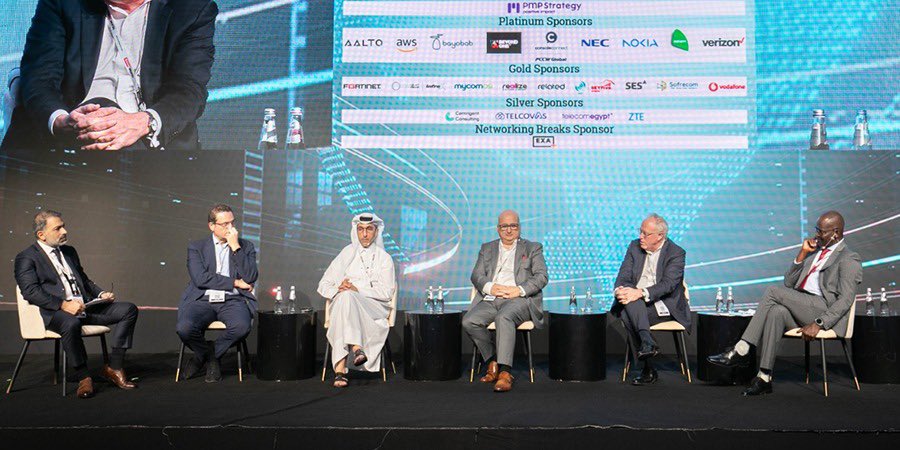During session 2 of the ICT Leaders’ Panel of the 17th Telecom Review Leaders’ Summit, a panel of esteemed experts gathered to discuss the regional and global outlooks of the ICT scene, major industry trends, the role of ICT leaders in supporting other sectors, and sharing best practices for achieving Sustainable Development Goals (SDGs). Elias Saab, Chief Commercial Officer of Sofrecom, moderated this panel.
Panel Contributors
- Bassam Yousef Al Ibrahim, CEO, Ooredoo Oman
- Fadi Pharaon, President of Middle East and Africa at Ericsson
- Ken Campbell, Partner at PMP Strategy
- Samer Halawi, CEO of AALTO HAPS
- John Omo, Secretary-General of the African Telecommunications Union (ATU)
Major Industry Trends
From a business perspective, Bassam Al Ibrahim, CEO, Ooredoo Oman stated that, “ICT will be a main driver for businesses.” Converting organizations and making them more agile with AI and fintech, among others, will push ICT to the future. “Moving from telco to techco will be more disruptive,” he added. As the company transitions from offering basic services, it is actively progressing to the next level through consistent investments, collaborative partnerships with businesses, and the continuous development of advanced technologies.
Fadi Pharaon, President of Middle East and Africa at Ericsson, has the same mindset when it comes to enterprises increasingly adopting 5G in the coming years. To adapt with the demand, “ensuring 5G base stations are cost efficient” is needed.
Ken Campbell, Partner at PMP Strategy, also shared his insights regarding the rise of 5G technology and its major trends such as “driving more fiber, addressing lower latency requirements, and deploying backhaul to cover rural areas.”
Samer Halawi, CEO of AALTO HAPS, highlighted the significance of satellite-based connectivity in providing internet access to remote areas and supporting sustainable development. “5G is connecting all of these possibilities,” said Halawi. He emphasized that cautious investment is key to ensuring comprehensive connectivity for all populations.
For John Omo, Secretary-General of the African Telecommunications Union (ATU), the importance of dealing with technological challenges, involving the youth in decision-making processes, realizing SDG goals, bridging the digital divide and empowering citizens, are the trends that stakeholders need to pay attention to.
Investment Outlooks
By optimizing investments while leveraging more tools, telcos can “catch up,” with the “technology changing every day.” If not, Ooredoo Oman indicate that this will “hold back” company advancements and the “competition will take over.”
Campbell further expounded that it is important to “think about how to rapidly commercialize assets as markets have changed significantly.” With his consulting expertise, he specified that “investments take years to scale, thus investors must reset their expectations and measure returns in a much better way.” In ICT, investing in data centers, for example, should not be done alone. Other forms of connectivity suitable to the company’s particular markets should be explored. “Sectors who don’t pay attention will suffer in a long run.”
With this in mind, the “capacity of operators to invest becomes more challenging,” and the telco to techco transformation becomes evident as “businesses focus on various sectors.”
The sector will move towards monetization and strategic investments, with “technology being a product of constant innovation,” stated Pharaon. The Ericsson executive then discussed the acquisition of Vonage, a global network platform for developers, highlighting its potential to generate billions of dollars by 2028.
For the industry, “open-mindedness with new ideas” is vital to policy development and social investment. “Telecom companies can no longer consider themselves only as an ICT company, more is required from telecoms,” Omo construed.
Technology Enhancements
Implementing AI within the company enables Ooredoo Oman to allow predictive maintenance and generative AI, resolving customer problems quickly. “In harnessing, teaching, and molding AI, we are not there yet,” Al Ibrahim pointed out. It is imperative to "give AI a persona" to effectively leverage its potential in business.
Campbell affirmed that AI transforms all businesses by taking over activities— from operations to commercializing.
From a policy perspective, “we must increasingly play in the space” to ensure the reliability and functionality of networks in Africa. Indeed, “not one technology can address or unlock all connectivity challenges, especially in Africa,” emphasized Omo.
ICT and SDGs
In the sustainability context, “we, as an industry, [should] contribute to sustainability, and think about how ICT solutions can support dropping carbon emissions,” Pharaon expressed. For Ericsson, they have three core initiatives aligned to SDGs: efficiency, digital inclusion (Connect to Learn) and financial inclusion (for unbanked people).
Through AALTO HAPS' platform (Zephyr), they offer a solution to connect less privileged people while sustainably powering aircraft operations. This is achieved through the utilization of advanced solar and battery technologies.
On the other hand, “in Africa, ICT plays a role in realizing SDGs, and it is incumbent, because SDGs are crucial in our network planning,” declared Omo.











